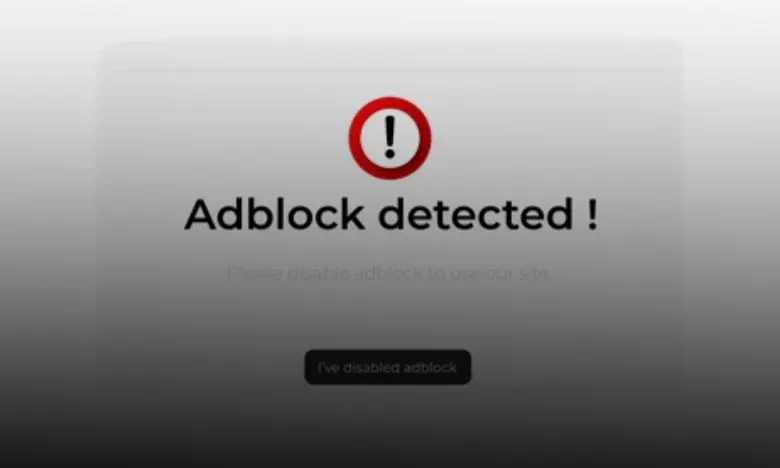Table of Contents
Introduction: Adblock Plus Blocked
In the ever-evolving digital landscape, the tug-of-war between online advertisers and ad-blocking tools has intensified. At the forefront of this battle is Adblock Plus (ABP), a widely-used browser extension developed by Eyeo GmbH. While ABP empowers users to control their online experience by blocking intrusive ads, it has also faced significant challenges from publishers and platforms aiming to safeguard their revenue streams. This article delves deep into the current state of ad blocking, the controversies surrounding Adblock Plus blocked, and the broader implications for users and the digital advertising ecosystem.
Understanding Adblock Plus blocked and Its Controversies
What is Adblock Plus?
Adblock Plus is a free, open-source browser extension designed to block unwanted advertisements, enhancing user experience and privacy. Available across major browsers like Chrome, Firefox, Safari, Edge, and Opera, ABP utilizes filter lists to determine which content to block or allow. Users can customize these lists or create their own, tailoring the browsing experience to their preferences. Adblock Plus Blocked
If you’re using Adblock Plus and still seeing intrusive ads, you might be facing a common issue where certain websites have implemented anti-adblock scripts. These scripts can detect and disable your ad blocker, causing frustration for users who value an ad-free browsing experience. In such cases, it’s essential to tweak your filter settings or consider advanced solutions. You can also check this guide on how to fix Adblock not working for detailed steps that work across multiple platforms and browsers.
The Acceptable Ads Initiative
One of the most debated features of Adblock Plus is its “Acceptable Ads” initiative. Under this program, certain non-intrusive ads are whitelisted by default, allowing them to be displayed even when the ad blocker is active. Eyeo GmbH argues that this approach supports websites reliant on ad revenue while maintaining a user-friendly experience. However, critics contend that the initiative compromises the core purpose of ad blocking and raises concerns about potential conflicts of interest, especially since larger companies can pay to have their ads whitelisted. Adblock Plus Blocked
Legal Battles and Industry Pushback
Eyeo GmbH vs. German Publishers
Adblock Plus has faced multiple legal challenges, particularly from German media companies. In a notable case, broadcasters RTL and ProSiebenSat.1 sued Eyeo GmbH, alleging that ABP’s operations were anti-competitive. However, in 2015, a Munich court ruled in favor of Eyeo, stating that users voluntarily install the software and that Eyeo’s market position wasn’t dominant enough to harm publishers significantly . This decision marked Eyeo’s fourth legal victory, reinforcing the legitimacy of ad-blocking tools.
Platform Countermeasures: The Case of Facebook
Major platforms like Facebook have implemented strategies to circumvent ad blockers. In 2016, Facebook announced technology to bypass ad-blocking software on its desktop site. In response, Adblock Plus quickly developed a workaround, restoring an ad-free experience for users. This ongoing cat-and-mouse game underscores the complexities of balancing user preferences with platform monetization strategies . Adblock Plus Blocked
The Impact of Manifest V3 on Ad Blockers
Google’s introduction of Manifest V3, a new extension platform for Chrome, has significant implications for ad blockers. This update restricts the capabilities of extensions, particularly affecting how they intercept and modify network requests. As a result, traditional ad blockers like uBlock Origin have faced challenges adapting to these changes. To comply, uBlock Origin developed a “Lite” version compatible with Manifest V3, though it lacks some advanced features of the original . Adblock Plus has also updated its extension to align with the new standards, ensuring continued functionality on Chrome and other compatible browsers .en.wikipedia.orgallaboutcookies.org
Alternatives to Adblock Plus
While Adblock Plus remains a popular choice, several alternatives offer distinct features and benefits: Adblock Plus Blocked
uBlock Origin
An open-source extension known for its efficiency and low resource usage. uBlock Origin supports a wide range of filter lists and offers advanced customization options. However, due to Manifest V3, its full-featured version is no longer available on Chrome, leading users to opt for the “Lite” version or switch to browsers like Firefox .
AdGuard
A comprehensive ad-blocking solution available as both a browser extension and a standalone application. AdGuard not only blocks ads but also offers features like phishing protection and parental controls. Its DNS-based filtering provides system-wide ad blocking across devices .en.wikipedia.org Adblock Plus Blocked
Ghostery
Focusing on privacy, Ghostery blocks ads and trackers, providing users with detailed analytics about blocked content. Its user-friendly interface and customizable settings make it a preferred choice for those prioritizing transparency and control .
Total Adblock and 1Blocker
Total Adblock offers robust ad-blocking capabilities, including the ability to bypass paywalls. 1Blocker, tailored for Apple users, integrates seamlessly with iOS and macOS, providing efficient ad blocking without compromising performance .
Comparative Overview
| Feature | Adblock Plus | uBlock Origin | AdGuard | Ghostery | Total Adblock | 1Blocker |
|---|---|---|---|---|---|---|
| Open Source | Yes | Yes | No | Yes | No | No |
| Acceptable Ads | Yes (default) | No | No | No | No | No |
| Advanced Customization | Moderate | High | High | Moderate | Low | Moderate |
| System-wide Blocking | No | No | Yes | No | No | Yes |
| Privacy Focus | Moderate | High | High | High | Moderate | High |
| Manifest V3 Compliance | Yes | Lite Version | Yes | Yes | Yes | Yes |
The Publisher’s Dilemma: Revenue vs. User Experience

For publishers, advertising revenue is often the lifeblood of digital operations. Major news outlets, bloggers, tech platforms, and content creators depend heavily on display ads, affiliate placements, or programmatic advertising to fund their content. However, as ad blocker adoption continues to rise globally—estimated to be used by over 40% of internet users according to Statista—publishers are feeling the squeeze. Adblock Plus Blocked
Some have responded by deploying anti-adblock scripts, which detect whether a user has an ad blocker enabled and either prompt them to disable it or restrict access to content until they do. Others adopt softer approaches like displaying a banner that appeals to users’ sense of fairness—explaining that ads help keep the content free.
Innovative models like ad-free subscriptions and micropayments (such as using services like Coil or Medium Partner Program) are slowly gaining traction but haven’t achieved mass adoption due to friction in user experience and lack of standardization.
The tension highlights a bigger issue: the lack of a unified value exchange framework between users and content creators. Ad blockers aren’t inherently “bad,” but they can unintentionally damage the very content ecosystem they’re meant to optimize. Adblock Plus Blocked
Ethical Considerations and the Role of Transparency
Ad blocking opens the door to nuanced ethical questions. Is it fair to consume free content while bypassing the ads that fund it? Does blocking trackers and surveillance-based targeting justify denying publishers revenue? Adblock Plus Blocked
This gray area is where transparency and user control become key. Tools like Adblock Plus and uBlock Origin empower users by giving them full visibility into what is being blocked—and more importantly, why. Users can customize filters, whitelist ethical publishers, or choose to participate in acceptable ad programs.
Industry analysts argue for a “consent-based economy” where users can selectively support brands and platforms they trust while rejecting manipulative or privacy-invasive practices. This could be the future paradigm, where ethical advertising is incentivized, and intrusive ads are filtered out by default.
Industry Perspectives: What Advertisers and Tech Giants Say
From the advertiser’s side, ad blockers pose a challenge—but also an opportunity. Forward-thinking advertisers are now prioritizing non-intrusive, native, and contextual ads that deliver value rather than distractions. For example, in-feed social media promotions, podcast sponsorships, and branded content are less likely to be blocked and more likely to be appreciated by audiences. Adblock Plus Blocked
Tech giants like Google, Apple, and Mozilla also play pivotal roles. Google, for example, has built limited ad-blocking functionality into Chrome through its Better Ads Standards initiative, which targets the most annoying ad formats like autoplay videos and pop-ups. Apple’s Safari integrates Intelligent Tracking Prevention, making it inherently more privacy-friendly.
This indicates a platform-level shift toward responsible advertising, where user experience becomes a competitive advantage. Adblock Plus Blocked
The Future of Ad Blocking and Online Monetization
Looking ahead, the ad-blocking landscape will continue to evolve, influenced by regulatory developments (like GDPR and CCPA), technological shifts (such as Manifest V3), and user expectations. Adblock Plus Blocked
Here are some likely future trends:
- AI-powered ad blockers that use real-time decision-making rather than static filter lists.
- Paywall fatigue, driving users to either whitelist sites or shift to curated, ad-free content platforms.
- Publisher cooperatives, where readers can pay a single subscription to support multiple websites (e.g., Scroll, now acquired by Twitter/X).
- Blockchain-based solutions like Brave browser’s BAT token model, rewarding users directly for their attention.
Ultimately, the success of any model will hinge on trust, transparency, and control. Users want meaningful content without compromising their privacy, and publishers need sustainable income to deliver that content. Bridging this gap is the next frontier.
Best Practices for Integrating Ad Blockers
- Understand Your Needs: Choose an ad blocker that aligns with your priorities, whether it’s comprehensive ad blocking, privacy, or system-wide protection.
- Stay Updated: Ensure your ad blocker is up-to-date to benefit from the latest features and security patches.
- Customize Filters: Tailor filter lists to suit your browsing habits, allowing non-intrusive ads or blocking specific content as needed.
- Support Content Creators: Consider whitelisting websites you value to support their revenue streams, especially if they offer quality, ad-supported content. Adblock Plus Blocked
Conclusion
The digital advertising landscape is in a state of flux, with ad blockers like Adblock Plus at the center of ongoing debates about user experience, privacy, and revenue models. While tools like ABP empower users to control their online environment, they also face challenges from publishers and platform changes like Manifest V3. As the ecosystem evolves, users must stay informed and choose solutions that best align with their values and browsing habits. Adblock Plus Blocked
FAQs
Q1: What is the Acceptable Ads initiative in Adblock Plus?
The Acceptable Ads initiative allows certain non-intrusive ads to be displayed by default. The goal is to support websites that rely on ad revenue while maintaining a user-friendly experience. Users can disable this feature in the settings.en.wikipedia Adblock Plus Blocked
Q2: How does Manifest V3 affect ad blockers?
Manifest V3 is a Chrome extension platform update that restricts how extensions can intercept and modify network requests. This change impacts the functionality of traditional ad blockers, leading to adaptations like uBlock Origin’s “Lite” version.en.wikipedia.org
Q3: Are there alternatives to Adblock Plus that don’t allow acceptable ads?
Yes, uBlock Origin and AdGuard are examples of ad blockers that don’t participate in the Acceptable Ads program, offering more stringent ad-blocking capabilities. Adblock Plus Blocked
Q4: Can I use ad blockers on mobile devices?
Yes, many ad blockers offer mobile versions or apps. For instance, AdGuard provides system-wide ad blocking on mobile, and 1Blocker is optimized for iOS devices.
Q5: Is it legal to use ad blockers?
Yes, using ad blockers is legal. Courts have upheld the legality of ad-blocking tools, emphasizing user choice in customizing their online experience.

